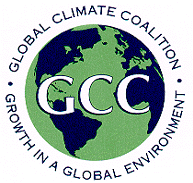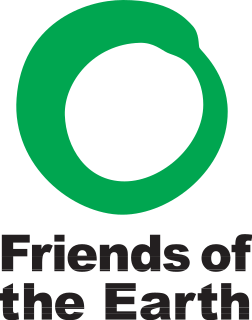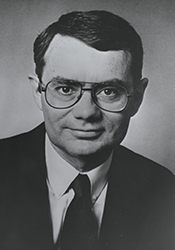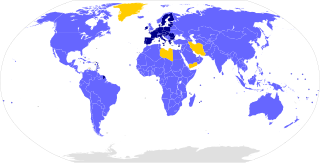
The Environmental Integrity Group (EIG) is a negotiation group consisting of 6 parties to the UNFCCC. When it was formed in 2000, it only consisted of Switzerland, Korea, and Mexico. [1]

The Environmental Integrity Group (EIG) is a negotiation group consisting of 6 parties to the UNFCCC. When it was formed in 2000, it only consisted of Switzerland, Korea, and Mexico. [1]
The Environmental Integrity Group was initiated by Switzerland during the negotiations of the Kyoto Protocol, where only party groups were allowed to negotiate. Switzerland was not part of any group and they did not want to join the Umbrella Group. So Switzerland declared to form the EIG and invited other independent parties to join. [2]

The Kyoto Protocol is an international treaty which extends the 1992 United Nations Framework Convention on Climate Change (UNFCCC) that commits state parties to reduce greenhouse gas emissions, based on the scientific consensus that (part one) global warming is occurring and (part two) it is extremely likely that human-made CO2 emissions have predominantly caused it. The Kyoto Protocol was adopted in Kyoto, Japan, on 11 December 1997 and entered into force on 16 February 2005. There are currently 192 parties (Canada withdrew from the protocol, effective December 2012) to the Protocol.

Switzerland, officially the Swiss Confederation, is a sovereign state situated in the confluence of western, central, and southern Europe. It is a federal republic composed of 26 cantons, with federal authorities seated in Bern. Switzerland is a landlocked country bordered by Italy to the south, France to the west, Germany to the north, and Austria and Liechtenstein to the east. It is geographically divided between the Alps, the Swiss Plateau and the Jura, spanning a total area of 41,285 km2 (15,940 sq mi). While the Alps occupy the greater part of the territory, the Swiss population of approximately 8.5 million is concentrated mostly on the plateau, where the largest cities are located, among them the two global cities and economic centres of Zürich and Geneva.

South Korea, officially the Republic of Korea (ROK), is a country in East Asia, constituting the southern part of the Korean Peninsula and sharing a land border with North Korea. The name Korea is derived from Goguryeo which was one of the great powers in East Asia during its time, ruling most of the Korean Peninsula, Manchuria, parts of the Russian Far East and Inner Mongolia under Gwanggaeto the Great. Its capital, Seoul, is a major global city and half of South Korea's over 51 million people live in the Seoul Capital Area, the fourth largest metropolitan economy in the world.

Mexico, officially the United Mexican States, is a country in the southern portion of North America. It is bordered to the north by the United States; to the south and west by the Pacific Ocean; to the southeast by Guatemala, Belize, and the Caribbean Sea; and to the east by the Gulf of Mexico. Covering almost 2,000,000 square kilometers (770,000 sq mi), the nation is the fifth largest country in the Americas by total area and the 13th largest independent state in the world. With an estimated population of over 120 million people, the country is the tenth most populous state and the most populous Spanish-speaking state in the world, while being the second most populous nation in Latin America after Brazil. Mexico is a federation comprising 31 states and Mexico City, a special federal entity that is also the capital city and its most populous city. Other metropolises in the state include Guadalajara, Monterrey, Puebla, Toluca, Tijuana and León.
Literature
'References
| This organization-related article is a stub. You can help Wikipedia by expanding it. |

Alliance 90/The Greens, often simply Greens, is a green political party in Germany that was formed in 1993 from the merger of the German Green Party and Alliance 90. The party focuses on ecological, economic, and social sustainability. Since January 2018 Annalena Baerbock and Robert Habeck have co-led the party. In the 2017 federal elections the Greens came sixth with 8.9% of the votes and 67 out of 709 seats in the Bundestag.

The Global Climate Coalition (GCC) (1989–2001) was an international lobbyist group of businesses that opposed action to reduce greenhouse gas emissions and publicly challenged the science behind global warming. The GCC was the largest industry group active in climate policy and the most prominent industry advocate in international climate negotiations. The GCC was involved in opposition to the Kyoto Protocol, and played a role in blocking ratification by the United States. The coalition knew it could not deny the scientific consensus, but sought to sow doubt over the scientific consensus on climate change and create manufactured controversy. The GCC dissolved in 2001 after membership declined in the face of improved understanding of the role of greenhouse gases in climate change and of public criticism.
The United Nations Framework Convention on Climate Change (UNFCCC) is an international environmental treaty adopted on 9 May 1992 and opened for signature at the Earth Summit in Rio de Janeiro from 3 to 14 June 1992. It then entered into force on 21 March 1994, after a sufficient number of countries had ratified it. The UNFCCC objective is to "stabilize greenhouse gas concentrations in the atmosphere at a level that would prevent dangerous anthropogenic interference with the climate system". The framework sets non-binding limits on greenhouse gas emissions for individual countries and contains no enforcement mechanisms. Instead, the framework outlines how specific international treaties may be negotiated to specify further action towards the objective of the UNFCCC

Friends of the Earth International (FoEI) is an international network of environmental organizations in 74 countries.
The following outline is provided as an overview and topical guide to green politics, a political ideology that aims for the creation of an ecologically sustainable society rooted in environmentalism, social liberalism, and grassroots democracy. It began taking shape in the western world in the 1970s; since then Green parties have developed and established themselves in many countries across the globe, and have achieved some electoral success.

The Green Party of Switzerland is the fifth-largest party in the National Council of Switzerland and the largest party that is not represented on the Federal Council.
The League of Conservation Voters (LCV) is an American environmental advocacy group. LCV says that it "advocates for sound environmental laws and policies, holds elected officials accountable for their votes and actions, and elects pro-environment candidates." The organization pursues its goals through voter education, voter mobilization, and direct contributions to political candidates. LCV includes 29 state affiliates. LCV was founded in 1969-1970 by environmentalist Marion Edey, with support from David Brower. The group's current president is Gene Karpinski. It is headquartered in Washington, D.C. and has over two million members.

The European Green Party (EGP), sometimes referred to as European Greens, is the European political party that operates as a federation of political parties across Europe supporting green politics. The EGP cooperates with the European Free Alliance (EFA) to form the Greens–European Free Alliance (Greens/EFA) parliamentary group in the European parliament.

The National Assembly of the Republic of Korea, often shortened to the National Assembly in domestic English-language media, is the 300-member unicameral national legislature of South Korea. Elections to the National Assembly are held every four years. The latest legislative elections were held on 13 April 2016. Single-member constituencies comprise 253 of the assembly's seats, while the remaining 47 are allocated by proportional representation. Members serve four-year terms.

James (Jim) Bacchus. Mr. Bacchus currently serves as a Distinguished University Professor of Global Affairs and the Director of the Center for Global Economic and Environmental Opportunity at the University of Central Florida in Orlando, Florida, since September, 2017. He was a founding member and twice chairman of the Appellate Body of the World Trade Organization in Geneva, Switzerland from 1995-2003. Mr. Bacchus served as a former member of the U.S. House of Representatives from Florida from 1991-1995. Bacchus has served as Chairman of the Global Trade & Investment Practice Group at Greenberg Traurig, a Miami-based international law firm. He was also Co-Chair of its Global Practice Group. Bacchus has regularly written trade related articles[1][2][3][4] for publications including Forbes and The Wall Street Journal. On February 23, 2007, Bacchus was named to a Department of Defense panel reviewing the Walter Reed Army Medical Center neglect scandal.[5]
Anti-environmentalism is a political movement that opposes action towards maintaining nature and the environment, such as reducing climate change. This view is often shared by the politically conservative or business groups. Anti-environmentalists seek to persuade the public that environmental policy impacts them negatively through public debate. Various groups in society have sought to counter the effects of environmental ideology and movements, to redirect and diminish public concern about the environment, to attack left-leaning environmentalists, and to persuade politicians against increased environmental regulation. Some anti-environmentalists may argue environmentalism is radical and "anti-human" due to environmentalist's concern for climate change and their belief that humans need to interfere with the Earth less, or stop all together.

Rising Tide North America is a grassroots network of groups and individuals in North America organizing action against the root causes of climate change and work towards a non-carbon society. Rising Tide North America is part of an international network dedicated to building a climate justice and anti-extraction movement. Rising Tide generally takes a strongly "no compromise" stance on the environment and a vehement opposition to solutions proposed by corporations who, they say, are responsible for creating environmental problems in the first place.

The Youth Climate Movement (YouNGO) or International Youth Climate Movement (IYCM) refers to an international network of youth organisations that collectively aims to inspire, empower and mobilise a generational movement of young people to take positive action on climate change.

The Global Greens (GG) is an international network of political parties and movements which work to implement the Global Greens Charter. It consists of various national Green political parties, partner networks, and other organizations associated with green politics.
GLOBE is the Global Legislators Organisation for a Balanced Environment, founded in 1989.

Young Friends of the Earth Europe (YFoEE) is a grassroots network of young people and youth organisations working together on social and environmental justice issues. It works collectively on the local, national and European level, to inspire young people, organise actions and events and get attention in the media, in politics and among the general public on issues important to young people.

The Paris Agreement is an agreement within the United Nations Framework Convention on Climate Change (UNFCCC), dealing with greenhouse-gas-emissions mitigation, adaptation, and finance, signed in 2016. The agreement's language was negotiated by representatives of 196 state parties at the 21st Conference of the Parties of the UNFCCC in Le Bourget, near Paris, France, and adopted by consensus on 12 December 2015. As of March 2019, 195 UNFCCC members have signed the agreement, and 186 have become party to it. The Paris Agreement's long-term goal is to keep the increase in global average temperature to well below 2 °C above pre-industrial levels; and to limit the increase to 1.5 °C, since this would substantially reduce the risks and effects of climate change.

The 2016 United Nations Climate Change Conference was an international meeting of political leaders and activists to discuss environmental issues. It was held in Marrakech, Morocco, on 7-18 November 2016. The conference incorporated the twenty-second Conference of the Parties (COP22), the twelfth meeting of the parties for the Kyoto Protocol (CMP12), and the first meeting of the parties for the Paris Agreement (CMA1). The purpose of the conference was to discuss and implement plans about combatting climate change and to "[demonstrate] to the world that the implementation of the Paris Agreement is underway". Participants work together to come up with global solutions to climate change.

Claudia Sheinbaum Pardo is a Mexican scientist, politician and incumbent mayor of Mexico City. She jointly received the Nobel Peace Prize in 2007 as a member of the Intergovernmental Panel on Climate Change. She was elected as mayor on 1 July 2018 as part of the Juntos Haremos Historia coalition. She is the second woman to serve as mayor but the first to be elected and the first member of the Jewish faith to be elected mayor of Mexico City.